Author: nishil, Biconomy member Source: biconomy Translation: Shan Ouba, Golden Finance
When we hear about the intersection of artificial intelligence and cryptocurrency, the projects that get the main attention in this category are networks that solve data collection, GPU computing, or data reasoning in the field of artificial intelligence. These include protocols such as Akash Network, Ritual net, etc. They stand out in the large artificial intelligence industry by leveraging the decentralization, incentives, censorship resistance, and privacy provided by web3.
While these projects are creating fascinating applications, their impact on everyday web3 users is still limited, and they are not effective in bringing new users into the web3 field.
The rise of artificial intelligence agents
With the rapid development of Web3, new crypto protocols, tokens, and applications continue to emerge. Even for the most experienced users, it is daunting to deal with this complexity. Hence, there is a growing trend of creating AI agents, which are smart assistants that make using crypto applications much easier. These AI agents sit at the crossroads of crypto and AI and are designed to solve the thorny User Experience (UX) issues in crypto. Imagine a future where you can just tell the AI agent what you want to achieve on-chain and it will automatically write and execute the necessary transactions for you.
AI agents will help us build an intelligent layer on top of the existing DeFi rails. This layer will be the TradFi equivalent of bankers, investors, traders, fund managers, etc. in web3. They will leverage the underlying primitives to conduct transactions on-chain.
DeFi-AI integration is expected to usher in advanced applications such as AI-driven lending, smart yield farming strategies, automated market making, and AI-assisted portfolio management. The use cases don’t stop there, AI agents can also play a role in the gaming industry, allowing users to have assistants and pets that help them navigate the game and enhance the overall user experience of the game.
Based on the type of use cases and the added value brought by the protocols, the evolving AI agent space can be roughly divided into the following categories:
Categories of AI Agents
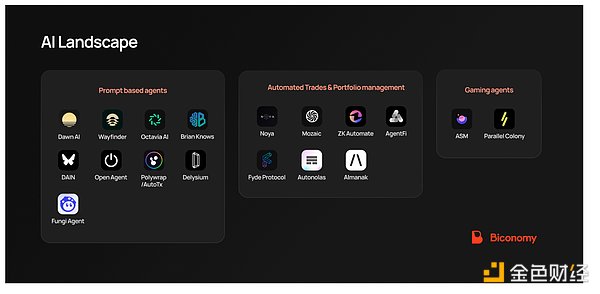
Game AI Agents:
Teams such as Parallel Colony are building gaming AI agents to enhance the gaming experience of users. These AI agents run in the Web3 environment and interact with players and game elements through on-chain smart contracts. AI agents are designed to act on behalf of users or as pets/assistants in games. These agents are designed in such a way that they can also interact and trade assets with other agents.
There are also a number of web2 and web3 games that are actively using AI to design dynamic non-player characters (NPCs) in games. But for the purpose of this article, we will focus only on AI agents that can trade and act on behalf of users.
Autonomous Portfolio Managers:
These AI agents can be used to manage a pool of assets from multiple different user profiles. The goal of the AI agent is to maximize the returns of the pool by delegating assets to various DeFi strategies by leveraging the right set of off-chain AI data streams. It is essentially a portfolio management service that leverages the power of AI. To ensure that the protocol is trust-minimized, projects also enable ZK (through protocols such as Modulus) to provide on-chain proofs of the AI reasoning generated in the process.
Prompt-based AI Agents:
Imagine a future where you can simply tell an AI agent what you want to achieve on-chain and it will automatically write and execute the necessary transactions for you.
This is the goal that most AI agent projects are thriving towards, and we can imagine that prompts may become the preferred way for ordinary users to interact with blockchains in the future.
Projects such as Wayfinder, Brian Knows, Aperture Finance, etc. are developing interfaces similar to ChatGPT that can help users conduct knowledge transactions directly on the blockchain by chatting with AI agents. These protocols leverage the power of LLM to convert user prompts and intentions into executable transactions.
Let’s discuss some of these AI agent protocols in detail:
Autonolas
Autonolas is a platform that can create and manage autonomous agent services. These services are called Agent Services and operate independently off-chain as Multi-Agent Systems (MAS), collaborating to achieve common goals. In essence, Autonolas enables developers to build and deploy autonomous agents that can work together seamlessly off-chain while leveraging blockchain technology to enhance on-chain functionality. BabyDegen is one such agent. Below is a catalog of other agents being built on the Olas network - Polywrap’s AutoTX Polywrap is building a network of specialized AI agents that perform complex tasks for web3 users and protocols. These agents leverage crowdsourced insights, off-chain and on-chain data sources, task planning, and batched transactions to efficiently solve problems and make decisions in a variety of areas. Current agents include those for payments, market research and trading, social content management, forecasting, and public goods funding. Future plans for Polywrap include expanding the range of specialized agents, decentralizing their execution, and evolving the system through community-driven governance. AutoTx is one such AI agent.
AutoTx can translate high-level user goals into a series of blockchain transactions. This means you no longer need to become an expert in each protocol or spend hours learning how to manually compose different types of transactions. Simply tell AutoTx what you want to achieve and it will take care of the rest.
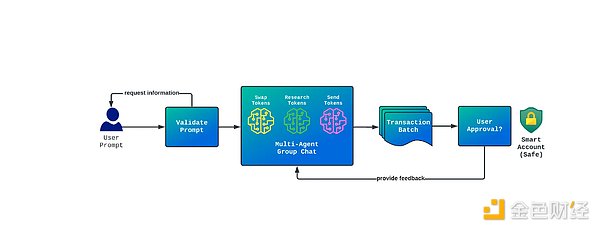
Parallel Colony
Parallel Studios is taking a fresh approach to AI agents with a new AI-driven Web3 survival game, Colony. In Colony, highly autonomous artificial intelligence agents, or “avatars,” continuously learn from their environment. Players must guide and work with these avatars, who have different skills and abilities, to survive competing colonies on a futuristic Earth.
Colony stands out for incorporating continuous learning into its gameplay. AI avatars learn from their experiences, identities, and goals, developing unique personalities and worldviews. Additionally, these avatars can autonomously manage digital assets through a dedicated Web3 wallet, allowing them to trade with other in-game avatars.
Whitepaper:https://paper.parallel.life/colony_paper_v1.pdf
Wayfinder
Wayfinder is creating a "map" for AI agents to handle tasks and simplify on-chain activities for users. Through open source development and incentivizing builders with $PROMPT tokens, Wayfinder will expand the network of navigation instructions. The pathfinding path will continuously enhance the capabilities of AI agents, making them smarter over time. It aims to connect blockchain and off-chain data sources, allowing users to easily perform tasks through the command prompt. Their innovations are designed to make blockchain interactions more efficient and accessible, improving users’ lives by reducing complexity and stress. You’ll love this analogy and explanation from @tiggity_tc on Wayfinder.
Here’s a video of the pathfinding agent in action:https://x.com/AIWayfinder/status/1779605000735367549
Whitepaper:
https://paper.wayfinder.ai/wayfinder_paper_v1.pdf
NOYA
NOYA is a decentralized finance (DeFi) protocol that enables artificial intelligence agents to securely and precisely manage liquidity across multiple blockchains. It uses a composable system built from the ground up, including a network of private guardians, AI-compatible oracles, and a competitive environment for AI and strategy managers. Noya has multiple vaults, each catering to a different user intent profile. The protocol has its own designed AI oracles to read various DeFi markets and pass the information to the AI agents. NOYA's infrastructure uses advanced technologies such as zero-knowledge machine learning (ZKML) to support multiple intents such as liquidity provision, leverage management, and borrowing rate optimization. It aims to set new standards for full-chain liquidity management and financial strategies. The team is closely rolling out access to the protocol. Brian provides APIs that developers can integrate into their applications so that users can generate web3 transactions by passing their intent via prompts such as “Can you swap 10 usdc for eth on Uniswap on Ethereum mainnet?”. They also provide smart contract deployment services via prompts. On the backend, the team uses LLM to convert the prompts into web3 transactions and then executes it via their preferred protocol and solver integration.
The team has also built a Brian app that you can use to explore the feature set. The team hopes to expand their product by providing users with options to set up recurring and automatic payments, among other things.
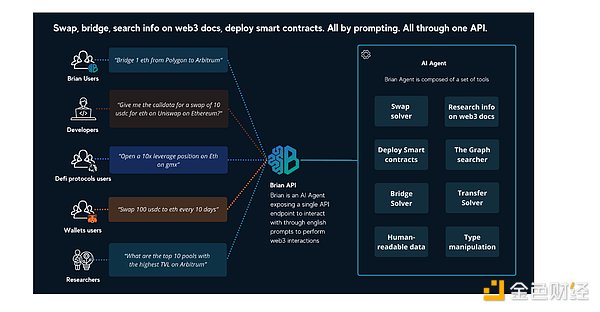
Aperture Finance
Aperture Finance revolutionizes DeFi by providing liquidity management services through a user-friendly protocol. It aims to enhance the DeFi user experience through an intuitive chatbox interface inspired by GPT, allowing users to express their goals in natural language. Third-party participants, called solvers, process requests by optimizing the process to ensure efficient and cost-effective execution.
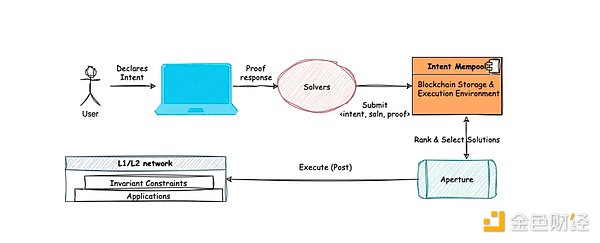
Fungi
Fungi leverages the power of smart accounts and account abstraction to provide a self-hosted AI agent experience. Fungi allows users to instruct the command prompt through its interface, which then processes real-time blockchain data and autonomously performs actions based on the user's instructions.
Users can chat with Fungi, deepen their understanding of cryptocurrency, receive personalized guidance, perform on-chain transactions, create customized DeFi strategies (Hyphas), and even monetize these Hyphas by sharing them with the community. Fungi acts as a network of agents that interact with each other and learn from past experiences, a financial superintelligence that is accessible to everyone.
Here's how Fungi works:
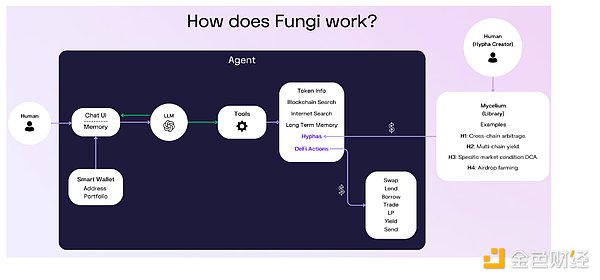
Source: https://words.odisealabs.com/defi-ai
Fyde Protocol
Fyde Enables users to grow their crypto holdings faster by depositing into diversified, AI-curated vaults that lock in yields and reallocate assets based on market performance and reduced volatility.
Users can deposit various tokens into these vaults and receive $TRSY, a token representing their share of the vault assets. Fyde aims to have consistent $TRSY liquidity across different market conditions, allowing users to easily trade.
The Need for an AI Authentication Layer for Intelligent Agents
Among all of these upcoming AI and intent-related projects, potential use cases range from abstracting simple tasks to empowering AI agents to execute complex DeFi strategies to find the best yields. However, these AI agents face two major challenges:
They are not truly autonomous: Currently AI agents can recommend on-chain actions and prepare transactions for users, but still require users to sign or approve these actions.
If they choose automation, they lose security: protocols tend to explore alternative solutions to automation, such as approvals, centralized vaults, shared private key pairs, etc., which make the protocol a custodian of assets and bring significant risks.
We need to provide guardrails for AI in the form of user-defined permissions - strictly defining which operations the AI can sign and which operations it does not have the right to sign. Therefore, we need a solution that can delegate transaction authorization to AI agents, but only within specific permissions and rules.
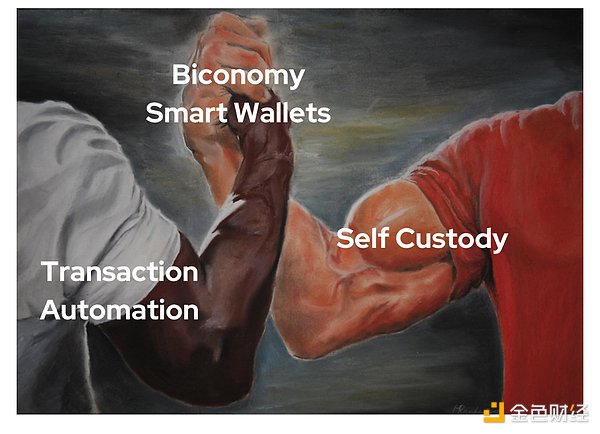
 JinseFinance
JinseFinance
 JinseFinance
JinseFinance JinseFinance
JinseFinance JinseFinance
JinseFinance JinseFinance
JinseFinance JinseFinance
JinseFinance JinseFinance
JinseFinance JinseFinance
JinseFinance JinseFinance
JinseFinance JinseFinance
JinseFinance JinseFinance
JinseFinance